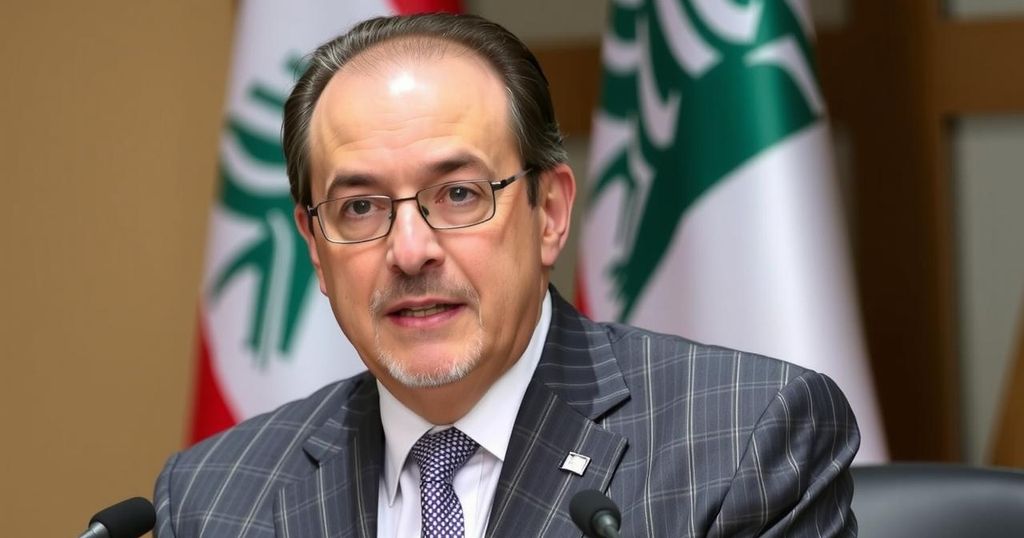Nawaf Salam Appointed Prime Minister of Lebanon Amid Political Challenges

Lebanon has appointed Nawaf Salam as prime minister following a two-year caretaker government, with substantial parliamentary support. Salam, an international jurist, faces significant challenges, including implementing reforms amid a severe economic crisis and navigating complex political dynamics. His nomination is viewed as a step towards political change, though the path to a functioning government remains uncertain.
Lebanon’s President Joseph Aoun has appointed international jurist Nawaf Salam, the presiding judge at the International Court of Justice, as the new prime minister, signaling a potential shift towards stabilizing the embattled country following a protracted period under a caretaker government. Aoun’s decision is backed by a majority in the Lebanese parliament, with 84 members supporting Salam amid the country’s ongoing economic crisis. Salam, who is expected to return to Lebanon shortly, will face the formidable challenge of implementing critical reforms to attract international aid necessary to rebuild Lebanon after years of political and economic turmoil.
The calls for change are reflected in the support for Salam by lawmakers who view him as a figure capable of rising above the pervasive corruption and nepotism associated with the previous administration. His candidacy marks a break from the traditional powers, particularly as an endorsement from independent lawmakers underscores a demand for a reformed political landscape. However, the political environment remains fractious, with Hezbollah and their allies preferring to retain interim Prime Minister Najib Mikati, who is perceived as part of the old political system that has contributed to Lebanon’s financial collapse.
Salam’s primary mandate will involve navigating Lebanon’s dire financial situation and the complexities of post-war reconstruction, particularly in areas ravaged by the recent conflict with Israel. Moreover, the future prime minister must endeavor to reconcile entrenched political divisions and respond to calls for a national agenda that prioritizes the welfare of the Lebanese populace. The dynamics of the Middle Eastern political landscape add additional pressure, as external influences often play a significant role in Lebanon’s internal affairs.
Ultimately, while the presidential nomination of Salam injects a degree of hope for structural reform and stability, the actual formation of a new government remains uncertain given the protracted nature of Lebanese politics, which often complicates swift governance changes. It remains to be seen how effectively Salam can navigate these challenges in his effort to foster a government capable of addressing the pressing needs of a nation in crisis.
The appointment of Nawaf Salam as prime minister of Lebanon comes at a critical time as the country grapples with one of the most severe economic crises in its history, exacerbated by political instability and the aftermath of a protracted caretaker government. This crisis has been marked by rampant corruption and mismanagement, leading to widespread public protests and demands for political reform since 2019. Salam’s selection is viewed by many as a response to these demands, representing a potential pivot away from the entrenched political systems that have failed the Lebanese citizens. Moreover, the geopolitical dynamics of the region, particularly the influence of Hezbollah and the broader implications of Israeli-Lebanese tensions, play a significant role in shaping Lebanon’s political future, necessitating a nuanced approach from the new leadership.
In conclusion, the selection of Nawaf Salam as Lebanon’s prime minister marks a pivotal moment in the country’s political landscape, with potential implications for economic reform and national stability. Salam’s appointment reflects a collective desire for a fresh approach to governance, one that seeks to distance itself from the traditional political structures associated with corruption. However, the success of Salam’s government will hinge on his ability to implement necessary reforms and navigates the complex political landscape that characterizes Lebanon’s governance. As the situation unfolds, the international community will be watching closely to see if this marks the beginning of a new phase for Lebanon.
Original Source: www.hindustantimes.com






